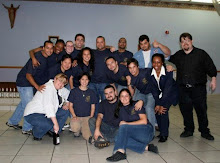Here are the first questions from Bible Alive: Jesus Christ, meeting Tuesday nights. To follow you will need to read the book Jesus Christ: Fundamentals in Christology, by Roch Kereszty, o. cist.
ISBN-10: 081890917X
ISBN-13: 978-0818909177
It can be ordered here
The following questions (modified and added to those on pp. 489-492) cover the Introduction and pp. 3-21.
Class One Questions:
1. What is the one major presupposition for the shape and content of the book Jesus Christ: Fundamentals in Christology?
2. What are the implications of this one major presupposition?
3. What is the role of the New Testament witness to Christ in relation to the Old Testament?
4. What is the role of the New Testament regarding future christological developments?
5. For Catholics—What is the role of the Magisterium regarding future christological developments?
6. For Catholics—On what grounds do we affirm that we can find valuable christological insights in the works of non-Catholic Christian theologians?
7. For all Christians—On what grounds do we affirm that we can find new perspectives for understanding the mystery of Christ in non-Christian religions?
8. Define “christology from above” and “christology from below” and explain their importance. Explain what happens if either of these is stressed at the expense of the other.
9. Describe the Liberal Quest. What is the basic presupposition for the “Liberal Quest” for the historical Jesus?
10. What cause or causes put an end to the “Liberal Quest”?
11. Describe the New Quest. When and how did the New Quest begin? Why?
12. Explain the inadequacies of the New Quest:
13. What characterizes the so-called “Third Quest” of the 1990s? To what extent is it justifiable to say that the quest for the historical Jesus runs in cycles?
14. What can we learn for a biblical christology from the study of Jesus by recent Jewish authors?
15. Define the basic presuppositions of the method of the Biblical part of this study. In particular:
a. How are “facts” the product of objective data and interpretation?
b. Why must a historian, pace Luke Timothy Johnson, go BEYOND facts?
c. In order to understand a person or persons, what else is needed beyond the knowledge of data and a rational analysis of the data? Why are the latter not sufficient?
d. Why should historians RESIST the rationalistic attempt to subsume every new act or person under general categories?
e. Why can every human person be understood only from the perspective of his or her death?
f. Why and how does the question of meaning arise in the study of history?
g. Why does the question of the meaning of history call for a philosophy or theology of history?
h. In light of the above, how do the method of historiography and the question of meaning in history call for a theological history of Jesus?
i. What can such a theological history of Jesus accomplish? What are its limitations?
16. What is assured by the inspiration of the biblical documents concerning Jesus? What is not assured by inspiration? (NOTE: for the answer read the Second Vatican Council’s Dogmatic Constitution of Divine Revelation, called “Dei Verbum”, number 11)
17. What is the source for our enterprise at constructing a theological history of Jesus Christ?
18. From what perspective does our source and model, the New Testament, understand Jesus and what is understood about Jesus?
19. What is the purpose of the Gospel writers?

1 comment:
Hi Bill,
I finally got a chance to go through the power point. Good stuff man. I totally agree with what you said in one of the earlier slides. It's easy for me to end up seeing this as mere head knowledge, when it's a lot more than just that. It's knowing God, whom we desperately need and love, for who He is. And I think the best cure for this head knowledge tendency that I have is, like you said, prayer.
May God bless you and your wife.
Remy.
Post a Comment